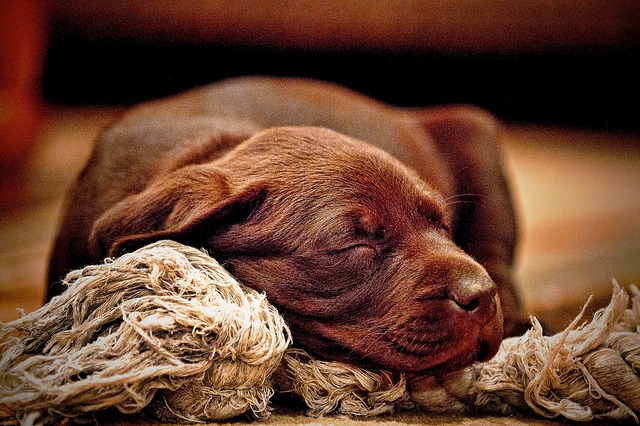
Puppy Development Timeline
 Training a new puppy can be both fun and challenging. While sometimes it might be tempting to throw in the towel and simply allow your puppy training to slip, this is a critical time in your fur baby’s development. As leading providers of Denver dog training services, we like to remind pet owner that time spent training today will pay off in spades for the rest of your dog’s life. To really take advantage of this critical stage, it’s first important to understand how your pup is developing. Let’s take a closer look at the imperative period between 6 and 16 weeks:
Training a new puppy can be both fun and challenging. While sometimes it might be tempting to throw in the towel and simply allow your puppy training to slip, this is a critical time in your fur baby’s development. As leading providers of Denver dog training services, we like to remind pet owner that time spent training today will pay off in spades for the rest of your dog’s life. To really take advantage of this critical stage, it’s first important to understand how your pup is developing. Let’s take a closer look at the imperative period between 6 and 16 weeks:
Your puppy is experiencing several different types of growth, simultaneously, during this period. These growth patterns include:
Week 6 to 16: Secondary Socialization
During this phase, your puppy is adapting to their new environment. This is the time you want to expose your pup to as many people, dogs, places and things as possible. This time period sets the tone for the rest of your pup’s life. By exposing them to different situations, at this time, you will build their confidence. Behavioral issues that become a problem later in life can typically be linked to this critical stage of puppyhood. While you do want to allow your pup to have fun with other puppies during this stage, you do not want to let them run wild. Instead, during all the excitement, work on training them to come to you and reward them with treats and praise when they obey.
Week 6 to 12: Exploration & Imprinting
The exploration phase is both fun and exciting. Your puppy will follow you around but also want to stray a bit. Allowing them to explore is important in building their confidence. While it is imperative to give them room to explore, it’s also important to do so in a controlled environment that will deliver positive, rewarding experiences. Before setting out to explore with your pup, make sure they are calm. Pampering or over indulging your pup when they become nervous, in this phase, will only reinforce their fear of new people and places. Rather than rewarding fearful behavior, redirect their attention to a toy or an activity they love.
Week 6 to 16: Play & Socialization Training
Puppy play is one of the best parts of this stage. This is your pup’s opportunity to test the limits of their surroundings. While this time can be fun, it is also a time that your pup can find themselves in trouble, therefore it’s very important to keep a close eye on them. It’s also your opportunity to join in the fun. Playing with your pup builds a bond while establishing trust. Begin teaching the drop it command at this time. Reward your pup’s obedience, particularly during this phase. Having structure during this time will help your dog understand their boundaries and begin to teach them basic manners.
Week 8 to 10: Fear Stage
The fear stage is typically just a two-week period but it can have far reaching affects. During this phase, it is important to encourage exploration with positive reinforcement. It’s critical to avoid forcing them into situations that make them nervous as this can instill lifelong phobias. Instead coax them into trying new things by doing your best to give things a positive spin. If you find a situation that you simply can’t turn into a positive experience, skip it until your pup is through the fear stage. You will both be better off as a result.
Week 10 to 16: Social Dominance Stage
This stage of puppydom is the culmination of all that your pup has learned over the last few weeks. They are beginning to understand where they fall in the social hierarchy of their surroundings. Your pup will fall into one of three categories: aggressive-dominant, sub-dominant, and inhibited-submissive. The majority of pups fall right in the middle as sub-dominant. Meaning they display confidence and exhibit characteristics of both dominance and submission. Those that are inhibited-submissive are incapable of asserting themselves and are prone to being dominated by others. Aggressive-dominate pups learn dominate behavior while still with their litter and continue to do so as they adapt to their new surroundings. It is extremely important to determine which category your pup falls in, to enable you to most effectively train them. Even an aggressive-dominate pup can be trained to play well with others and respect boundaries.
Denver Dog Training
Throughout each of these phases, consistent, effective dog training is key. Here at Sit Means Sit, we have earned a reputation as a leading provider of Denver dog training services. We work with dogs of all ages and temperaments. However, we always encourage those adopting a pup to get started right away. We help with all manner of training, including things like holding place. By working with your pup from the very beginning you can save your family a lot of stress, avoid instilling unwanted behaviors in your new friend and oftentimes avoid destructive tendencies. If you are ready to learn more about our Denver dog training services, contact us! Allow us to provide a complimentary, no-obligation consultation. Schedule your consult today!
While you’re here, we also encourage you to connect with us on social media: Facebook, Twitter and Google+! Sit Means Sit thanks you!
